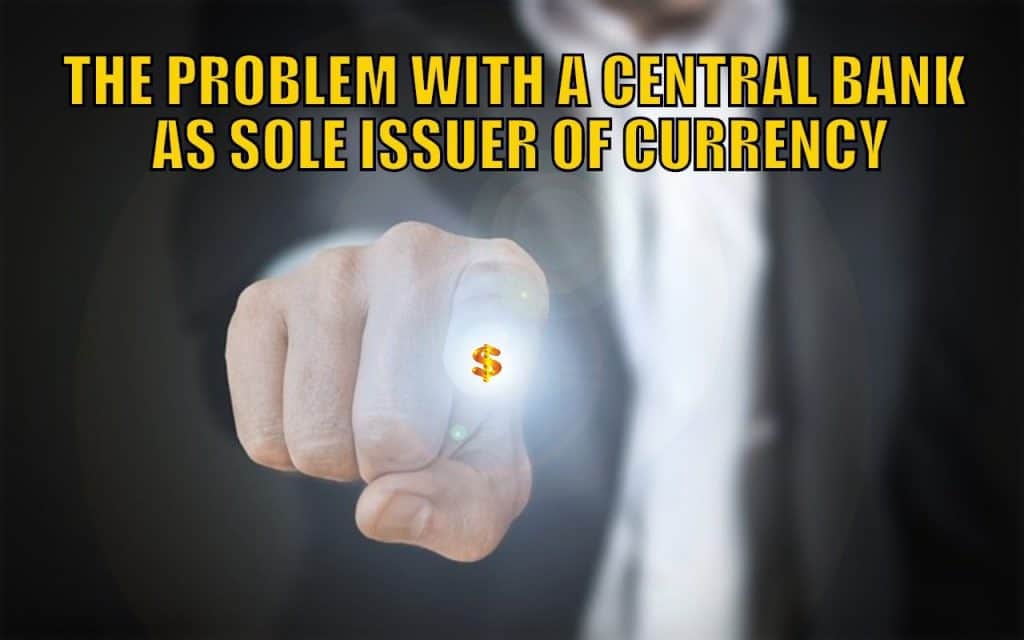There is a push to stop commercial banks issuing money and reserve this role for central banks to be the sole issuer of currency. What’s the problem with this idea?
This year we’ve covered extensively how the Reserve Bank of New Zealand (RBNZ) has been looking into the pros and cons of creating its own central bank digital currency.
See:
1. RBNZ Cryptocurrency to Replace NZ Physical Currency with a Digital Alternative?
2. Update on the War on Cash: Australia Moving to Cashless Society? + RBNZ on Digital Currency
3. RBNZ on Central Bank Digital Currency and Negative Interest Rates
4. RBNZ: Too Early to Say for Central Bank Digital Currency – Reading Between the Lines
Many other central banks around the world have also been looking into digital currencies recently on the back of the rise of cryptocurrencies.
The overall take away from all these goings on is that we are steadily moving towards a cashless society. This gives the central planners many advantages including:
- Track and tax every payment you make or receive – there is no “cash economy”, no “cash jobs”
- Freeze deposits and then bail-in deposits in case of a failing bank – see here for more on what happens to your deposits in a bank failure in New Zealand
- Enact negative interest rates without people escaping to cash
- No bank runs – Once all money is digital, there can’t be a run on a bank anymore. You won’t be able to remove your money if you see it coming in advance.
For more on the war on cash see: War on Cash: Implications for New Zealand
However there is more to this than just having digital money and going cashless. There is currently more talk of central banks being the sole issuer of currency available the public.
Central Bank as Sole Issuer of Currency
You may have heard about the Swiss referendum which lead to a vote on having the Swiss central bank as the sole issuer of currency. Called Vollgeld (Sovereign Money) – this would have banned private money creation by banks. The vote failed but it is an indication of an idea starting to form.
A recent Bloomberg article also publicised a proposal
“to give “the general public—individuals, businesses, and institutions—the option to have a bank account at the Federal Reserve.” Their FedAccount would let anyone keep money at the Fed, track it online or in an app, and make instant payments. “FedAccount balances would be fully sovereign money,” they write, “just like reserve balances that commercial banks hold. There would be no possibility of default on balances of any size. Deposit insurance would be superfluous.”
The author thinks that “on its own terms, it seems like a pure improvement.”
Source: Bloomberg – Maybe Dollars Should Be Digital
The Problem with a Central Bank as Sole Issuer of Currency
At a glance this idea of central banks being the sole issuers of currency might seem to have merit.
After all the banks have managed to privatise their profits and socialise their losses first with bail-outs and more recently, in the likes of Cyprus, bail-ins.

So understandably there is no love lost for the banks.
Therefore cutting them out of the picture seems to make sense and will be a popular notion.
The current monetary and banking system is certainly a shambles. But as is often the case if you don’t peel back the layers and look deeply enough for the root cause and problem, you end up with a bad solution.
And we’d say restricting the banking sector to only a central bank would end up even worse than the current system. Having a few bureaucrats control every aspect of money would end up even worse than we have today. We’d have completely centralised control of who was loaned what and how much.
It’s a bit like saying today’s form of government doesn’t really work that well. So let’s go full communist instead so the government can control all of society’s problems.
Having Even More Centralised Control is Not the Answer
People have forgotten, actually they just have no idea, of how banking started.
The crucial aspect is that of time deposits and demand deposits.
Read more: Unsound Banking: Why Most of the World’s Banks Are Headed for Collapse
You see a bank once served 2 roles. As a safe keeper of gold and silver. And then as a lender.
Demand deposits were gold or silver you wanted stored safely for use in the near future. You paid the bank for keeping it safe.
Whereas time deposits were savings you did not need access to for a set period of time. You allowed the bank to loan these savings out for the same period of time. In return you received interest.
Now banks merely borrow short to lend long (20 years or more on property). So we have duration mismatch. This is at the heart of today’s monetary problems and is important to understand.
For more on how fractional reserve banking began see: Why Fractional Reserve Banking is Not the Problem
Sandeep Jaitly who we paraphrased in the above article proved quite the astute observer when he said back then of the bank bailouts:
“This nationalisation of the deposit system means no persons deposits will be at risk, almost anywhere in the world. The system should have imploded [in 2008] under the massive debt burden but the nationalisation meant this wasn’t allowed to happen. So now no one’s time deposit is at risk.
An economic expansion is now likely to occur at some point in time due to the much greater monetary base but it will not be a real recovery just a nominal one. Stock prices will likely soar, not because productivity has increased but rather because the collapse was not allowed to occur and the greater monetary base will eventually find its way into the system.”
What Might be the Answer?
On top of a change in the monetary and banking system, if we must have tax, then perhaps a land tax may be the best choice – but only if all other taxes were removed.
Implementing a land tax would reduce the price of land to zero. If that ever happened (unlikely!), then the land value could not be borrowed against. Why? Because the land’s value is being collected in advance each year. Therefore the yearly ‘earnings’ of the land would not be capitalised into a tradable ‘price’.
It’s likely that with these 2 changes, bankers would revert to their traditional role of lending to business owners and innovators not merely to continue pushing up the value of property. Any lending on property would be based upon the house or building upon it, rather than the land underneath. An interesting concept.
So don’t fall for the line that private lending is evil. It is merely the way in which lending is performed today that is the problem.
In the meantime become your own central bank, and get some bullion reserves as financial insurance.
Buy gold or buy silver today.

